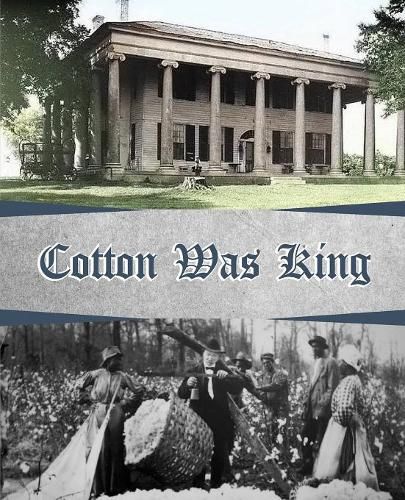Readings Newsletter
Become a Readings Member to make your shopping experience even easier.
Sign in or sign up for free!
You’re not far away from qualifying for FREE standard shipping within Australia
You’ve qualified for FREE standard shipping within Australia
The cart is loading…






This title is printed to order. This book may have been self-published. If so, we cannot guarantee the quality of the content. In the main most books will have gone through the editing process however some may not. We therefore suggest that you be aware of this before ordering this book. If in doubt check either the author or publisher’s details as we are unable to accept any returns unless they are faulty. Please contact us if you have any questions.
Colonel William Lindsey McDonald and his family are credited for Cotton was King. With emphasis on Lauderdale County, Alabama, the book was especially enhanced by Mrs. Dot McDonald allowing me to use some of the stories that had been written by her late husband. Angela Broyles of Bluewater Publishing had developed an agreement for me to use some of Mr. McDonald’s writings in completion of the book with the permission of his family. Without the cooperation of the William Lindsey McDonald family and Angela Broyles, the contents of this book would be greatly diminished. Since I was an admiring fan of Colonel William L. McDonald’s writings, I was very much honored to co-author the book. I greatly appreciate the opportunity that I was given to write and co-author this book.
Rickey Butch Walker has captured the enormous role cotton played in the history of this region. Walker describes the importance of cotton and slavery for the Native Americans who first explored and used this area, now known as Lauderdale County, even before white settlers arrived. The first section alone justifies the purchase of this book. Butch presents a wonderful account of the Indian claims to the land, together with stories of Doublehead and Chief George Colbert kin and the twisted dealing with the Government before the Indian Removal. The next section of the book describes the early white settlements that depended upon black slaves, and the final section details some of the Lauderdale County plantations, family relationships, and holdings, pre-Civil War. Walker had the benefit of an unpublished manuscript of William L. McDonald, the distinguished local historian who passed away in 2009. Many of McDonald’s stories are nicely integrated throughout the text. This is a valuable read for anyone interested in local history.
$9.00 standard shipping within Australia
FREE standard shipping within Australia for orders over $100.00
Express & International shipping calculated at checkout
This title is printed to order. This book may have been self-published. If so, we cannot guarantee the quality of the content. In the main most books will have gone through the editing process however some may not. We therefore suggest that you be aware of this before ordering this book. If in doubt check either the author or publisher’s details as we are unable to accept any returns unless they are faulty. Please contact us if you have any questions.
Colonel William Lindsey McDonald and his family are credited for Cotton was King. With emphasis on Lauderdale County, Alabama, the book was especially enhanced by Mrs. Dot McDonald allowing me to use some of the stories that had been written by her late husband. Angela Broyles of Bluewater Publishing had developed an agreement for me to use some of Mr. McDonald’s writings in completion of the book with the permission of his family. Without the cooperation of the William Lindsey McDonald family and Angela Broyles, the contents of this book would be greatly diminished. Since I was an admiring fan of Colonel William L. McDonald’s writings, I was very much honored to co-author the book. I greatly appreciate the opportunity that I was given to write and co-author this book.
Rickey Butch Walker has captured the enormous role cotton played in the history of this region. Walker describes the importance of cotton and slavery for the Native Americans who first explored and used this area, now known as Lauderdale County, even before white settlers arrived. The first section alone justifies the purchase of this book. Butch presents a wonderful account of the Indian claims to the land, together with stories of Doublehead and Chief George Colbert kin and the twisted dealing with the Government before the Indian Removal. The next section of the book describes the early white settlements that depended upon black slaves, and the final section details some of the Lauderdale County plantations, family relationships, and holdings, pre-Civil War. Walker had the benefit of an unpublished manuscript of William L. McDonald, the distinguished local historian who passed away in 2009. Many of McDonald’s stories are nicely integrated throughout the text. This is a valuable read for anyone interested in local history.